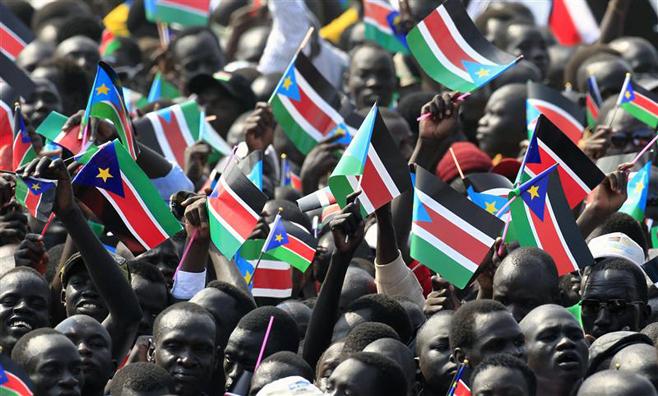The United Nations’ (UN) top human rights body, the Human Rights Council, has extended the mandate of the Commission on Human Rights (CoHR) in South Sudan – a team of investigators collecting and preserving evidence of atrocities and human rights violations committed in South Sudan. DefendDefenders welcomes the resolution adopted today and stresses that scrutiny of South Sudan’s human rights situation remains vital.
“By extending the mandate of the CoHR in full, the Council did the right thing for both human rights and peace and security in South Sudan,” said Hassan Shire, Executive Director, DefendDefenders. “Continued scrutiny and work towards accountability, including for sexual and gender-based violence and conflict-related abuses, are integral parts of a sustainable solution to South Sudan’s conflict.”
The resolution adopted by the Council today extends the CoHR’s mandate for one year. The COHR, which is composed of three independent human rights experts, was established in 2016. It has a broad mandate to determine and report the facts and circumstances of, collect and preserve evidence of, and clarify responsibility for alleged gross violations and abuses of human rights and related crimes, including sexual and gender-based violence and ethnic violence, with a view to ending impunity and providing accountability.[1]
The Commission’s last report documents crimes under international law, including deliberate starvation of civilians, the recruitment and use of children in armed conflict, pervasive sexual and gender-based violence with a “recognizable pattern of terror and subjugation,” severe restrictions on South Sudanese citizens’ fundamental rights, the impact of economic crimes on the enjoyment of economic, social, and cultural rights, and deeply entrenched impunity. These findings are highlighted in today’s resolution, which also condemns denial of humanitarian access and attacks on civilian infrastructure, and violence and intimidation towards civil society, human rights defenders, humanitarian personnel and journalists. It stresses the need for accountability and justice.
“Accountability for grave violations is part and parcel of ‘African solutions to African problems’,” said Memory Bandera, Director of Programs and Administration at DefendDefenders. “With the Peace Agreement, the South Sudanese parties committed to ensuring justice. Regional actors and African States at large supported this approach. With today’s resolution, the international community reiterated its support to placing justice and human rights at the centre of a new South Sudan.”
The Revitalised Peace Agreement for Resolution of the Conflict in the Republic of South Sudan (R-ARCSS), was signed on 12 September 2018. Over 17 months later, on 22 February 2020, five Vice-Presidents were sworn in and, in early March, a transitional government of national unity was formed. While DefendDefenders welcomes these developments, we have cautioned that they are yet to translate into human rights progress. Key provisions of the R-ARCSS, including Chapter II (transitional security arrangements) and Chapter V (transitional justice, including the establishment of the Hybrid Court for South Sudan) remain unimplemented. Millions remain internally displaced and vulnerable to acute food insecurity.
On the ground, the peace and security situation remains volatile, with ongoing significant risk factors of violence, such as intercommunal tensions and conflict over livelihoods, often with an ethnic overtone and patterns of grievances and revenge fuelled by national-level politics. In May 2020, hundreds of civilians lost their lives in intercommunal violence.
Ahead of the Council’s 43rd session (24 February-20 March 2020; resumed 15-23 June 2020[2]), DefendDefenders coordinated the drafting of a joint civil society letter[3] calling for the renewal of the mandate of the CoHR. During the session, we also launched a brief[4] based on evidence gathered during a February 2020 mission to the country. Findings include the fact that the space for human rights defenders, civil society, and the media is under attack and that fear and self-censorship among independent actors are mounting. A full report, “Targeted but Not Deterred,”[5] was published on 19 May 2020.
For more information, please contact:
Hassan Shire
Executive Director, the East and Horn of Africa Human Rights Defenders Project on [email protected] or +256 772 753 753 (English and Somali)
Nicolas Agostini
Representative to the United Nations (Geneva), the East and Horn of Africa Human Rights Defenders Project on [email protected] or +41 79 813 49 91 (English and French)
[1] Commission on Human Rights in South Sudan: https://www.ohchr.org/EN/HRBodies/HRC/CoHSouthSudan/Pages/Index.aspx
[2] Due to the COVID-19 situation, the session was suspended on 13 March 2020. It decided to “extend all mandates and mandated activities that would otherwise expire, until the date on which they can be considered by the Council when the 43rd session is resumed.” The Council resumed its work on 15 June 2020 and started adopting resolutions on 19 June 2020.
[3] DefendDefenders et al., “Joint letter: Extend the mandate of the UN Commission on Human Rights in South Sudan,” 6 February 2020, https://defenddefenders.org/joint-letter-extend-the-mandate-of-the-un-commission-on-human-rights-in-south-sudan/ (accessed on 11 June 2020).
[4] DefendDefenders, “New Policy Brief: DefendDefenders Examines the Ongoing Grave Violations & Volatile Security Situation in South Sudan,” 5 March 2020, https://defenddefenders.org/new-policy-brief-defenddefenders-examines-the-ongoing-grave-violations-volatile-security-situation-in-south-sudan/ (accessed on 11 June 2020).
[5] DefendDefenders, “Targeted but Not Deterred: Human rights defenders fighting for justice and peace in South Sudan,” 19 May 2020, https://defenddefenders.org/targeted-but-not-deterred-human-rights-defenders-fighting-for-justice-and-peace-in-south-sudan/ (accessed on 11 June 2020).
Download the PDF document.

